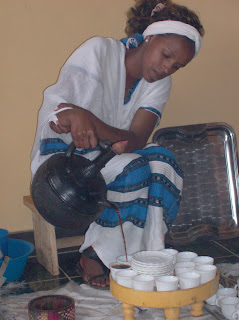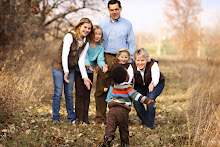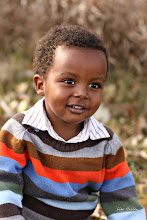Hosanna
"Five o'clock, five o'clock," Auto Girma said, as he knocked on everyone's doors to wake them up. We had to leave at 6:00 a.m. for the little town of Hosanna. It would be a four hour bus ride there.
On our way there, we saw the beautiful countryside of Ethiopia. It was filled with big, beautiful hibiscus trees, fake banana trees, and thatch roof huts. The terrain was made up of big rolling hills that swooped down into enormous valleys. Once in a while, we passed through a small village.
Halfway there, we stopped at a "nice" hotel to use the bathroom. Most of the toilets did not flush and the bathroom was for both men and women. We also had to bring our own toilet paper.
While we were standing in line to use the bathroom, some maids were peeking out of a doorway and watching us. They were pointing and giggling at my little sister, Avery, who has almost white hair. They weren't making fun of her; they just really adore people with blond hair because they don't see them often.
When we reached Hosanna, a traditional coffee ceremony was presented for us and the other adoptive families in our group. The lady who did it was a very beautiful Ethiopian woman in traditional Ethiopian garments. These traditional outfits are usually made of cotton fabric with colorful embroidery stitching on them. Many of them have crosses embroidered on them.
In a coffee ceremony, the beans are roasted right there on hot coals. The lady who did the ceremony came around with the roasting beans so we could smell the aroma of them. When the beans were roasted, she crushed them up and poured water over them. The, she poured the coffee into the cups and a man gave one to each of us. It is impolite to not take coffee so my sisters and I had to drink it. We only used a little spoonful of sugar with it. Surprisingly, it was very good.
Coffee is a very important crop in Ethiopia because that is where it was first discovered.
We had to walk a half mile to a different building to use a bathroom with a western style toilet. While walking down the muddy street, children from the village crowded around us. They asked us, "Hello, how are you? What is your name?"
I specifically remember a girl whose name was Tesfanesh. She looked like she was about my age. She didn't have fancy clothes or money, but she seemed pretty happy because she was smiling widely and laughing.
(Not Tesfanesh but another beautiful girl who loved getting her picture taken.)
As she walked alongside me, she talked to me in Amharic, the main language in Ethiopia. She started pointing down at my feet. I couldn't figure out what she meant until another mom told me that she liked my shoes. Then I told her, "amasenganallow." which means "thanks you" in Amharic.
I thought it was a very amazing experience meeting her because she was just like the African children I have heard of or read about. She appeared very poor, very dirty, had torn clothes and probably not much more than that. I admired her because even though she had she had close to nothing, she looked happy and content with her life. I wanted more than anything to take her home with me.
It makes me feel guilty thinking about this when I have clothes, when I have clean water, when I have money to buy food and I still complain about them.
When our bus pulled away, all of the children ran after us, probably longing for us to stay with them.
On the way home, we visited a school our agency was sponsoring. It consisted of two small white buildings which had nothing in them but a concrete floor. There were no desks, no books and no chalkboard. There was not a playground outside for the children to play. Imagine this school standing next to Discovery? I'm very thankful for the school I go to.
We also had an opportunity to visit a hut that a family so kindly opened up to us. IT was a very beautiful hut, with lovely painting on the outside. Inside was the family's kitchen, living room, bedroom, and it was also where they kept their cows, goats and sheep. It was really interesting seeing how this family lived compared to my family. I don't know how I could survive in these conditions.
Outside and across the street was a stream of orange colored water. There were children playing in it and people collecting water from
it. It may have been the only source of water they had.
Going to Hosanna opened my eyes to the world's poverty. What's sad is that two billion people on our earth live like this.











.jpg)







.jpg)



No comments:
Post a Comment